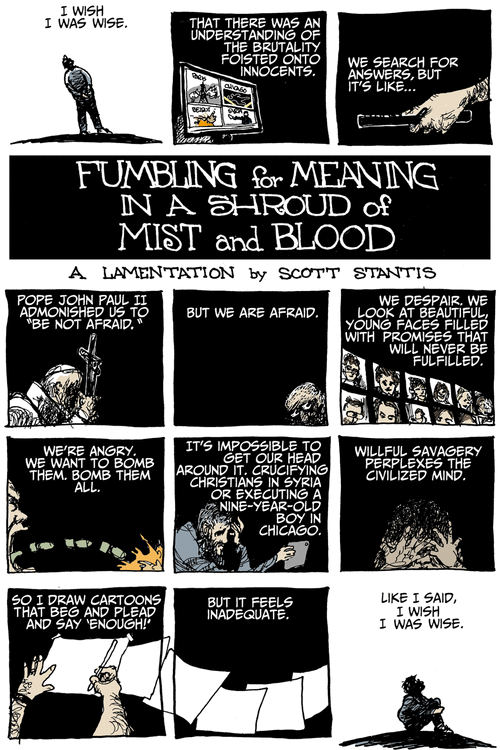Scott Stantis reflected on the recent violence in Paris, France with an uncharacteristically long political cartoon on November 20, 2015. What is normally a single tableau, Stantis made the effort to write a more detailed account of his feelings toward terrorism in thirteen panels. This is not a rant about how awful the Muslim jihadists are or a cheerleader cartoon about how the United States will crush ISIS, it is an introspective look into the futility of using words and pictures to demonstrate that words and pictures are inadequate to describe the helplessness that many of us feel about the violent world situation.

This medium that normally works like a rebus puzzle to amuse news junkies takes on a more somber tone and is no longer enigmatic, in order to cut to the heart of civilized thought. People are taught by the founders of all major religions that it is better to talk through differences than to fight over them, but both words and pictures have failed. In his cartoon, Stantis says, "We're angry. We want to bomb them. Bomb them all." When we do, we are disgusted with ourselves for taking out innocent children and civilian bystanders. The military calls those deaths "collateral damage," a term that appalls us even more for its thoughtlessness.
There are candidates for President who are trying to encapsulate the answer to Stantis's concerns in a fifteen-second sound bite. They will deprive peace-seeking refugees of relative safety in order to prevent an attacker from harming an American. How many Muslim lives is equal to one American life?
It is fairly shocking to open one's newspaper to the editorial page and expect a chuckle at the expense of bloviating politicians but receive a philosophical eye-opener. However, the eye-opener puts all of the bloviating in perspective. The politicians don't have the answer and the cartoonists don't have the answer. But the difference is that this cartoonist admits that he does not have the answer. We appreciate political analysts who don't have all the answers; maybe we ought to elect politicians who know they don't have all the answers instead of those who think they do.
